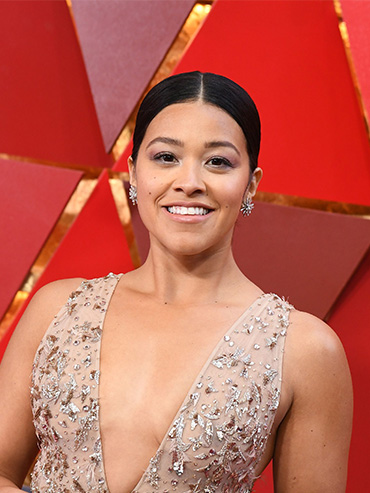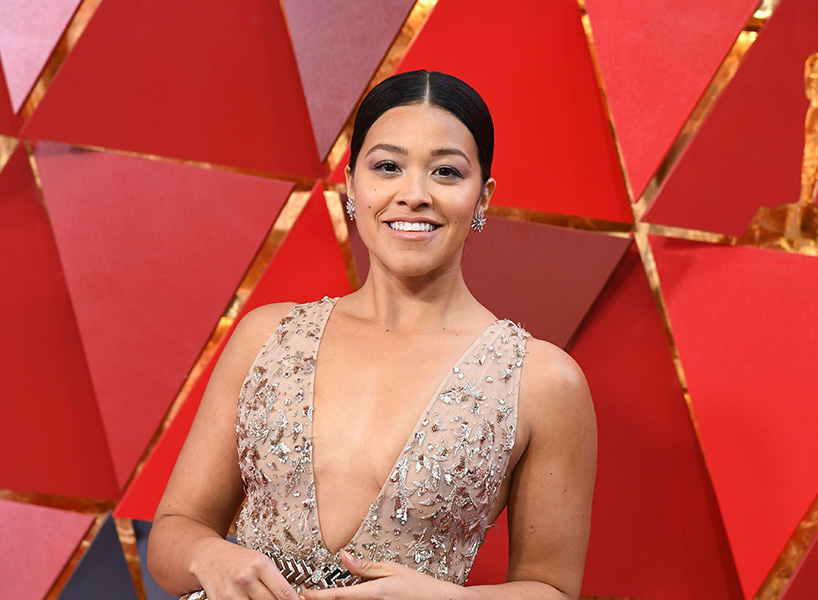Why Gina Rodriguez’s Comments Are Problematic Even If They Don’t Seem Offensive
Your problematic faves aren't always male and/or white


Jane the Virgin actor Gina Rodriguez is known for a lot of things: her activism, her Latina pride, her fitness-based #couplegoals relationship with fiancé Joe Locicero and her affinity for form-fitting red-carpet dresses. And now, some are saying, she’s becoming notorious for making anti-Black comments.
Rodriguez—who has starred on the hit TV show as title character Jane Villanueva since 2014—graced the November cover of Net-a-Porter’s Porter Magazine as part of its third annual “Women in Television” issue, speaking alongside silver-screen heavyweights Gabrielle Union, Ellen Pompeo and Emma Roberts about everything from the TV shows that changed their lives to power imbalances and diversity both on- and off-screen. The four actors also engaged in a roundtable discussion, where Rodriguez commented on pay inequity. Speaking to her experience in the industry, she noted that Latina women make less money than actors of other races.
“I get so petrified in this space talking about equal pay especially when you look at the intersectional aspect of it,” she said in the discussion. “Where white women get paid more than Black women, Black women get paid more than Asian women, Asian women get paid more than Latina women, and it’s like a very scary space to step into.”
While the comment may at first seem innocuous, Twitter users were quick to correct Rodriguez’s statement. Film and TV critic Rebecca Theodore-Vachon tweeted: “Re: regarding Gina Rodriguez saying Black actresses are paid more than Latinx actresses – Sofia Vergera is the highest paid according to Forbes ($42.5mil). Kerry Washington is the only Black actress on this list at #8.”
…All I'm saying is a quick Google could have cleared this up instead of giving inaccurate information. This is very disappointing.
— Rebecca Theodore-Vachon (@FilmFatale_NYC) November 23, 2018
Rodriguez seemed to be referring to pay disparities among women in general, not within the entertainment industry—a 2018 National Partnership for Women and Families study found that Black women are typically paid 61 cents, Native American women 58 cents and Latinas just 53 cents for every dollar paid to white men. But in the context of the roundtable, and Hollywood, her comments are oversimplified and inaccurate. Furthermore, several people on social media pointed out how Rodriguez’s comments undermine Black women, while also pitting women of colour against each other—and that’s a problem.
https://twitter.com/hlndoan/status/1066318298042720256?ref_src=twsrc%5Etfw%7Ctwcamp%5Etweetembed%7Ctwterm%5E1066318298042720256&ref_url=https%3A%2F%2Fthegrapevine.theroot.com%2Fajax%2Finset%2Fiframe%3Fid%3Dtwitter-1066318298042720256%26autosize%3D1
https://twitter.com/Christiana1987/status/1066059777917288449
This isn’t the first time Rodriguez has been called out for anti-Black statements
While Rodriguez has long been outspoken about racial inequality in Hollywood—using her platform to speak out about pay inequality for Latina workers, encouraging young people, their communities (and their abuelas!) to vote, and highlighting actors of colour through her #MovementMonday posts on Instagram—this isn’t the first time she’s been accused of anti-Black racism. In July 2017, she faced backlash over a tweet in the lead-up to the January 2018 release of Black Panther, the first superhero film to feature a predominantly Black cast. “Marvel and DC are killing it in inclusion and women, but where are the Latinos?! Asking for a friend…,” the actor tweeted.
https://twitter.com/hereisgina/status/889167374955315200?lang=en
In response, Twitter users called out Rodriguez for taking away from the film’s groundbreaking script and all-Black cast by calling for Latina representation with a “what about us?” attitude, while simultaneously failing to acknowledge the work of Tessa Thompson and Zoe Saldana, both Afro-Latinx actresses and stars of Thor and Guardian’s of the Galaxy, respectively.
It is quite possible for Gina Rodriguez to advocate for better Latinx representation without constantly evoking African American advances in a way that implies they're part of the problem. If she refuses to learn that, her cultural activism actually perpetuates the problem.
— Sofia Quintero (@sofiaquintero) November 24, 2018
https://twitter.com/beatriceca/status/895829070004539394
I honestly wonder how Black latinas like Gina Torres, Tatyana Ali, Tessa Thompson, and even the perpetually lost Zoe Saldana feel about Gina Rodriguez’s consistent jabs at Black women.
— bominiscious (@CNRush) November 23, 2018
Then in September 2018, Rodriguez was accused of erasing the experience of Black women while doing press for her movie Smallfoot with co-star Yara Shahidi. When Shahidi was asked a question about being a role model for young Black women, Rodriguez corrected the interviewer, stating “so many women.”
Just letting y’all know this ain’t Gina Rodriguez’s first time speaking over a Black women and tryna essentially All lives matter shit. All she cares about are highlighting and empowering white and mestizx Latinx women
— la jodona suprema 🤸🏾♀️ (@lareinanegraa) September 27, 2018
Critics say her comments pit women of colour and communities against each other
“To be honest I wasn’t shocked [at Rodriguez’s comments], given her comments in the past,” says Yamikani Msosa, a Toronto-based anti-oppression facilitator and equity consultant. “Rodriguez is missing an understanding of structural factors that contribute to inequity, and that it’s not necessarily about pitting women of colour against other women of colour,” she says.
She describes Rodriguez’s comments as playing into what she calls the “oppression Olympics,” the idea that one or more marginalized groups have to prove themselves as more oppressed than the other. “It can feel like crabs in the bucket in terms of survival,” Msosa says. Because of this, she explains, the focus becomes a comparison between marginalized communities, rather than dismantling systems of oppression.
For the same reason, she is also critical of Theodore-Vachon’s tweet about Sofia Vergara. “That’s great that Sofia is a Latinx actor that makes this money,” Msosa says, “but again—it’s not about who’s on top, it’s about us all having access; and I think that’s the point that’s missing.”
Real progress means equity, not equality
In order to see true representation on screen, we have to work towards getting everyone in the margins at the centre and visible, says Msosa. “We can’t look at it through this fragmented idea of who makes more [money]—because it doesn’t matter, that number can change and shift at any time.”
What’s most important, she explains, is not everyone being paid equally, but rather everyone having the same access to opportunities. Striving for equality rather than equity, she says, fails to take into account that racialized women, women living with disabilities and trans women need different support. “Because I have a disability, access is going to look different for me,” she says. “It’s not just about me walking through the door, it’s what size is the door? Does the door have an accessibility button?”
“It’s more than just a comment,” Msosa says of Rodriguez’s interview. “Whether or not she wants to acknowledge it, this is a systemically held belief around anti-Black racism—and she needs to work that shit out.”
This piece was originally published on November 27, 2018.
Related:
Sylvia Plath is My Problematic Fave. So What Does This Say About Me?
Reminder: Priyanka Chopra Is Not the Only Option to Play Ms Marvel
Not All Comic Book Heroes Wear Capes—They Wear Hijabs Too








